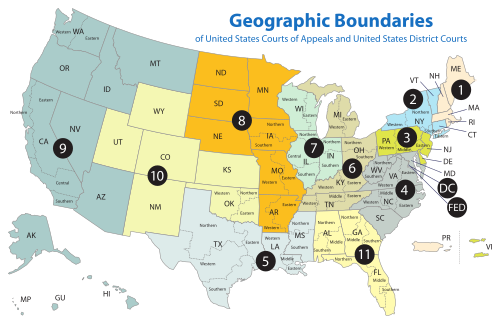Assistant United States Attorney
An Assistant United States Attorney (AUSA), often referred to as a federal prosecutor, is an official career civil service position working for the federal government of the United States in the United States Department of Justice, assigned to a local district of the United States Attorney's Office under the supervision of the regional U.S. Attorney.[1] In 2008, there were approximately 5,800 assistant United States attorneys employed by the United States Government.[2] Although many are "prosecutors", not all assistant U.S. attorneys work in Criminal Divisions, and may work in Civil, Appellate, or other divisions. As of 2020 they earned a starting base salary of $55,204, adjusted significantly for local cost of living.[3] Assistant United States attorneys working in a criminal division generally handle large case loads; however, as most federal prosecutions end in plea bargains, they will typically try only two to six cases annually.[1]
Special Assistant United States Attorney[]
Federal law authorizes the Attorney General to appoint Special Assistant U.S. Attorneys, known as SAUSAs, "to assist United States attorneys when the public interest so requires."[4] In addition to designating non- federal employees, the SAUSA designation is also given to prosecutors who are employed by another agency, such as the Social Security Administration, United States Postal Service, or Federal Bureau of Investigations, but work alongside AUSAs because of their expertise. They are paid by that agency and seconded to the United States Attorneys Office for a set period of time. This designation may also be given to an AUSA who is seconded to a different district or from Main Justice to a specific office. Appointing local prosecutors or enforcement attorneys to assist in a joint investigation and prosecution has been criticized for having the potential for conflicts of interest, selective and vindictive prosecution, as well as dual and successive prosecution.[4] Uncompensated SAUSAs can also be unpaid volunteers; the positions carry the same duties as assistant United States attorneys but are typically held by young lawyers seeking to establish "professional credibility".[5][6]
References[]
- ^ Jump up to: a b Baranouski, Elise; Ruttenberg, Joan; Stafford Stein, Carolyn (2014). "The Fast Track to a U.S. Attorney's Office" (PDF). Harvard Law School. Retrieved 2020-10-12.
- ^ Richman, Daniel (2009). "Political Control of Federal Prosecutions: Looking Back and Looking Forward" (PDF). Duke Law Journal. 58/8. Durham, NC: Duke University School of Law. 58 (8): 2088. ISSN 1939-9111. JSTOR 20684788. Retrieved 2020-10-12.
- ^ "Administratively Determined Pay Plan Charts". United States Department of Justice. 2020-03-06. Retrieved 2020-10-12.
- ^ Jump up to: a b Killion, Victoria L. (Fall 2009). "No Points for the Assist? A Closer Look at the Role of Special Assistant United States Attorneys in the Cooperative Model of Federal Prosecutions" (PDF). Temple Law Review, Volume 82, No. 3. Temple University Beasley School of Law. pp. 789–826. ISSN 0899-8086. Retrieved 2020-10-12.
- ^ Danzig, Christopher (2012-01-26). "The DOJ Wants You, Experienced Attorneys — To Work for Free". Above the Law. Retrieved 2020-10-12.
- ^ Davidson, Joe (2013-07-18). "'Special' assistant U.S. attorneys work for free". The Washington Post. Retrieved 2020-10-12.
- Assistant United States Attorneys
- United States law stubs

